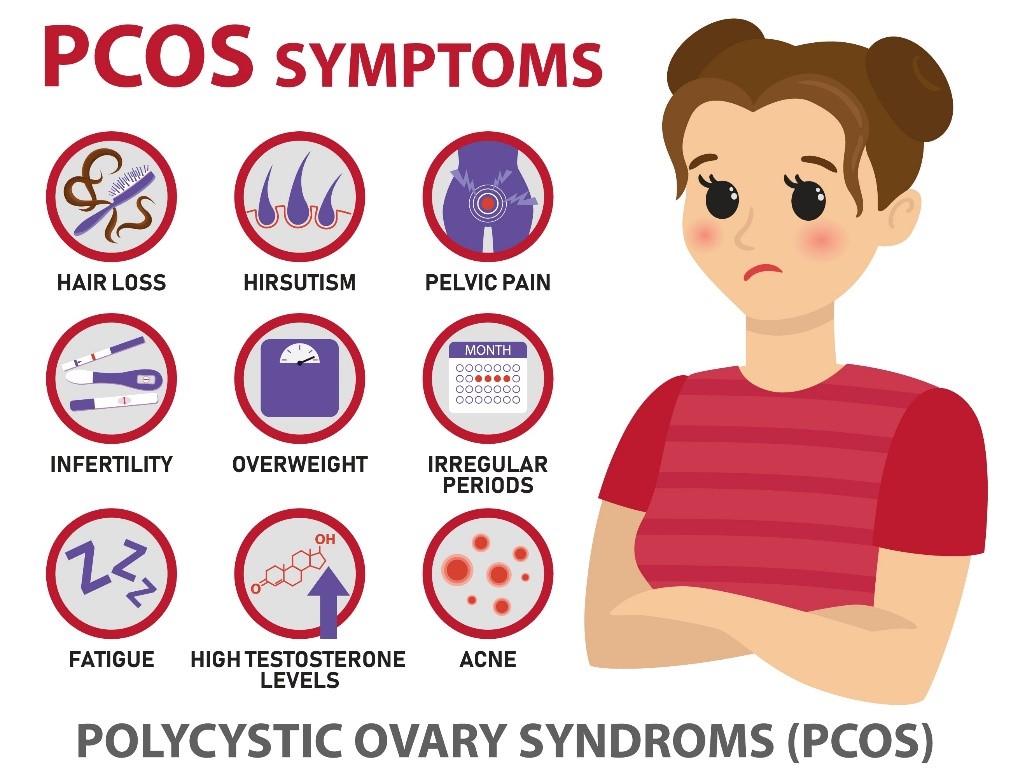
Are you tired of pimples popping up on your face, darkening neckline or stubborn weight gain on your belly? Well, you’re not alone. In the United States, an estimated 5 to 6 million women have PCOS. Polycystic Ovary Syndrome (PCOS) is a common hormonal disorder that affects countless women during their reproductive years. It’s more than just irregular periods and acne; it’s a frustrating condition which affects your physical and emotional well-being.
Often misunderstood and underestimated, PCOS can manifest in a variety of ways, making it challenging to diagnose. From missed or irregular periods and unwanted hair growth to weight gain and acne, the symptoms can be both physical and emotional. But PCOS is about more than just these surface-level issues. It’s a condition that can increase the risk of serious health problems like type 2 diabetes, heart disease, and endometrial cancer.
If you’re struggling with PCOS, understanding it is the first step towards managing it effectively. Join us as we explore this condition, its symptoms, the impact on daily life, and available treatment options.

What is PCOS in Non-Medical Terms?
Polycystic Ovary Syndrome, or PCOS, is like your body’s internal clock going haywire. It’s a common hormonal disorder that messes with your ovaries, the little powerhouses that produce eggs. Instead of releasing an egg every month like clockwork, your ovaries might go on strike.
This hormonal imbalance can cause a whole bunch of other issues too. This includes having extra hair sprouting where it shouldn’t, breakouts popping up like crazy, and your periods acting like unpredictable party guests. That’s PCOS in a nutshell.

Symptoms of PCOS
It’s important to note that not all women with PCOS will experience all of these symptoms. If you’re concerned about your menstrual cycle, weight, or any other changes, we recommend you to consult a healthcare provider for a proper diagnosis. Here are some common signs:
Irregular Periods
One of the most common indicators of PCOS is irregular menstrual cycles. This can include:
- Missed periods: Having fewer than nine periods a year.
- Infrequent periods: Cycles longer than 35 days.
- Heavy bleeding: Periods that last for several days or are unusually heavy.
Hormonal Imbalance
PCOS causes excess androgen levels (male hormones), which results in:
- Hirsutism: Unwanted hair growth on the face, chest, back, or other areas.
- Acne: Persistent or severe acne, especially on the face, chest, and back.
- Hair loss: Thinning hair or male-pattern baldness.
Ovarian Changes
Your ultrasound scans reveal Polycystic Ovaries aka enlarged ovaries with multiple small cysts. These follicles surround the eggs and may fail to regularly release them, disrupting the menstrual cycle.
Weight Gain
Many women with PCOS experience weight gain, particularly around their midsection. This weight gain can aggravate other symptoms and increase the risk of developing diabetes.
Skin Changes
PCOS often causes skin tags and darkened skin patches in the neck, armpits, or groin areas.
Treating PCOS: A Personalized Approach
There’s no one-size-fits-all treatment for PCOS, as it affects women differently. The best approach often involves a combination of lifestyle changes and medical interventions.

Lifestyle Modifications
- Weight management:
Even a slight change in weight can significantly improve PCOS symptoms. A balanced diet rich in fruits, vegetables, and whole grains, combined with regular exercise, is key.
- Regular physical activity:
Aim for at least 150 minutes of moderate-intensity exercise per week. This helps regulate insulin levels and boost mood.
- Stress management:
Techniques like yoga, meditation, or deep breathing can help manage stress, which can worsen PCOS symptoms.

Medications
The specific medication will depend on your symptoms and goals.
- Birth control pills:
These can regulate menstrual cycles, reduce acne, and help with excess hair growth.
- Metformin:
Primarily used to manage type 2 diabetes, metformin can also improve insulin sensitivity in women with PCOS, leading to weight loss and regular periods.
- Anti-androgen medications:
These can help reduce excess hair growth and acne by blocking the effects of male hormones.
- Fertility medications:
If you’re trying to conceive, medications like clomiphene or gonadotropins can stimulate ovulation.
Other Treatments
There are other treatments for PCOS too.
- Mental Health:
Dealing with PCOS can be stressful and emotionally taxing. Seeking help from a mental health professional can be beneficial. Cognitive-behavioral therapy (CBT) and mindfulness practices can help manage anxiety and depression related to PCOS.
- Surgery:
In rare cases, surgical procedures like ovarian drilling may be considered for women with severe PCOS who haven’t responded to other treatments. Ovarian drilling involves making tiny holes in the surface of the ovaries to lower the levels of androgen that can contribute to PCOS symptoms.
- Hair removal:
Laser hair removal or electrolysis can help manage unwanted hair growth to alleviate the symptoms of PCOS.
In a Nutshell
Living with PCOS is a journey that’s unique to every woman. It can be tough to navigate the ups and downs of irregular periods, unwanted hair growth, or struggling with weight. But remember, you’re not alone.
By understanding your body and working with healthcare providers, you can find ways to manage your PCOS symptoms. Whether it’s making lifestyle changes, trying different treatments, or connecting with other women who get it, there’s hope for a healthier, happier you.

